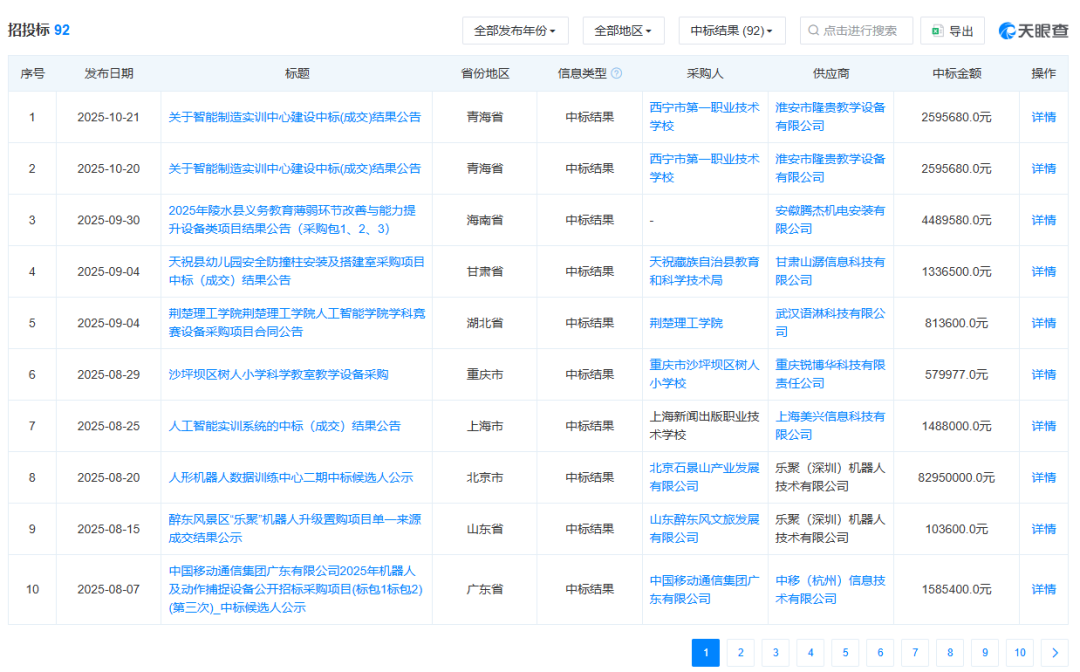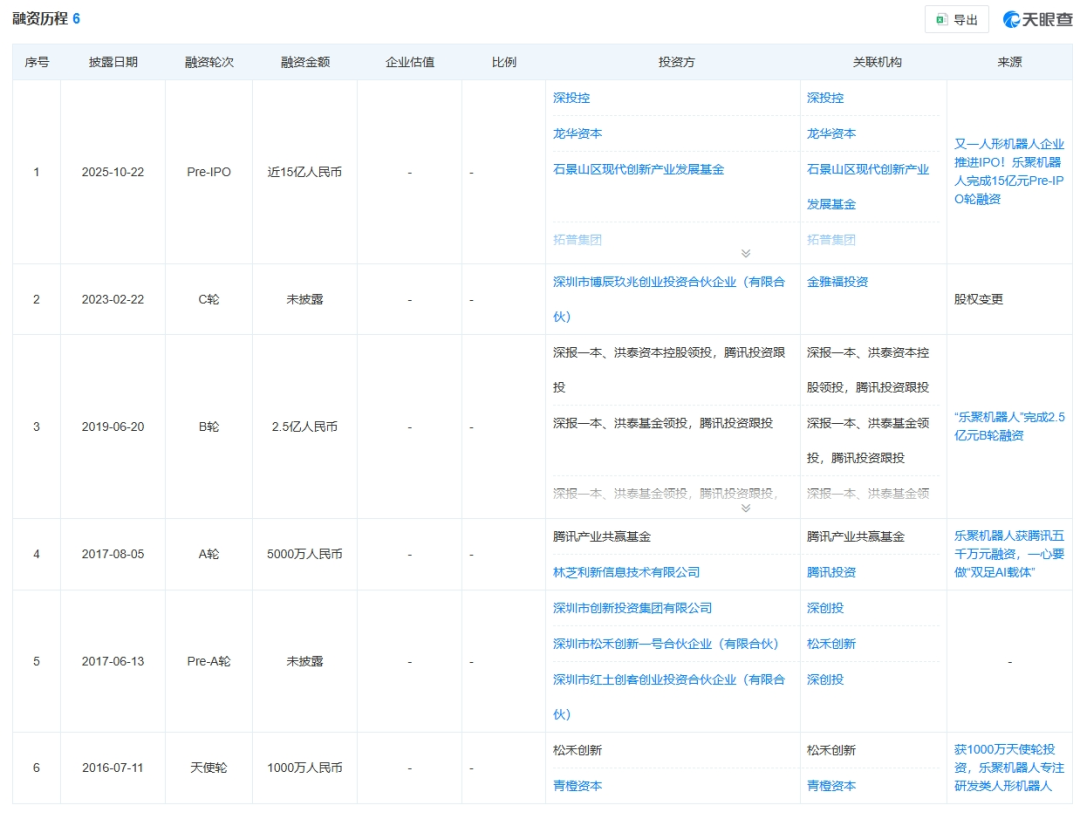Tencent and Moutai Vie for Investment: Leju, a Formidable Rival of Unitree, Also Sets Sights on IPO
![]() 10/27 2025
10/27 2025
![]() 449
449
Source | Yuan Media Group
A significant financing round has thrust a previously low-key humanoid robot unicorn into the spotlight.
Recently, Leju Robotics announced the completion of a Pre-IPO financing round, raising nearly 1.5 billion yuan. The funds will be allocated to bolster core technology R&D, deepen industrial chain integration, and expand industrial scenario applications. The investor lineup for this round is stellar, featuring prominent names such as Shenzhen Investment Holdings Capital, Shenzhen Longhua Capital, Qianhai Infrastructure Investment, Shijingshan Industrial Fund, Dongfang Precision, Tuopu Group, CITIC Goldstone, and China Securities Investment, among others.
Shortly after, rumors swirled in the market that "Leju Robotics has completed its share reform and is accelerating its IPO plans." In response to these speculations, Yuan Media Group reached out to Leju for comment but had not received a response as of the press release.
According to Tianyancha, on September 9, Leju's corporate entity type transitioned from a 'limited liability company' to a 'joint-stock limited company,' and its name was changed from Leju (Shenzhen) Robotics Technology Co., Ltd. to 'Leju Intelligence (Shenzhen) Co., Ltd.'
Since 2025, the humanoid robot sector has remained a hotbed of activity, shifting its focus from the scale of financing to the volume of orders. Leading players like UBTECH, Unitree Technology, and Zhiyuan Robotics have secured substantial orders. Leju has also demonstrated strong performance, with its order volume surging by 200% in the first quarter, according to comprehensive reports.
However, the close ties between Leju's order sources and its shareholder network have drawn market scrutiny.
01
Propelled by Shareholder Orders
In the current market frenzy, an IPO by any humanoid robot company is hardly surprising. After all, with capital pouring into the sector, technological advancements in humanoid robots have accelerated from 'minor updates every six months and major upgrades annually' to 'minor updates monthly and major upgrades quarterly.' Some companies even claim weekly or even daily progress in their humanoid products.
According to incomplete statistics, by the end of June 2025, the global humanoid robot sector had witnessed over 83 financing events, with total funds raised exceeding 14 billion yuan, surpassing the 2024 full-year record of 67 events and 11 billion yuan. The intense capital influx is propelling this emerging sector from a 'boom' phase to a 'head-to-head' industrial competition stage.
With accelerated technological iteration, expanded terminal application scenarios, and surging orders, the next logical step is to pursue an IPO. However, a closer examination reveals that the outcome may not be as optimistic as imagined.
Yuan Media Group's research indicates that the so-called 'massive orders' announced by current humanoid robot companies may contain some 'embellishment.' Many companies rely on orders from shareholders and partners to enhance their image, spinning tales of 'exploding orders.'
On October 9, Zhiyuan Robotics officially announced a multi-billion yuan robot framework order from ODM giant Longcheer Technology, which had invested in Zhiyuan earlier in the year. Additionally, Zhiyuan secured large orders worth tens of millions of yuan from Fulin Precision and Dafeng Industrial. Prior to this, Zhiyuan had already co-invested with these two companies to establish joint ventures.
A similar scenario unfolded with UBTECH, the 'leader' in humanoid robots. Its 2024 annual report disclosed that Juran Zhijia planned to purchase and deploy 500 UBTECH simulation humanoid robots by the end of 2025, with a sales target of 10,000 units during the cooperation period. Tianyancha reveals that Juran Zhijia is an early investor in UBTECH.
Leju is no stranger to this strategy. On July 21, Leju signed a strategic cooperation agreement with Dongfang Precision to achieve large-scale manufacturing of humanoid robots and promote their application in industrial, commercial, and household sectors. At the time, Leju had just completed its shareholder structure adjustment, with Dongfang Precision becoming a new shareholder.
Beyond shareholder orders, Tianyancha shows that since 2025, most of Leju's bid-winning orders have come from schools. This trend is not unique to Leju; companies like UBTECH, Unitree, and Zhiyuan also rely heavily on schools as their primary buyers. This has raised industry doubts: 'Excluding sales to schools, rentals for performances, orders from financial backers, and government purchases, how many robots have these companies truly sold?'

Image sourced from Tianyancha
From equity investment to industrial collaboration and then to order fulfillment, this seems to have become an 'implicit' business strategy among humanoid robot companies. However, while this shareholder-order-bound model provides crucial support in the early stages of company development, the market ultimately values a company's ability to independently secure orders in the long run.
02
Tencent and Moutai Compete for Investment Stakes
Leju is among the early pioneers of humanoid robots in China.
In 2012, Leju's founder, Leng Xiaokun, led the Harbin Institute of Technology robotics team onto the CCTV Spring Festival Gala stage. Four years later, he relocated to Shenzhen and established Leju (Shenzhen) Robotics Technology Co., Ltd. In its inaugural year, the company launched Aelos, China's first small bipedal humanoid robot capable of rapid walking.
Later, capitalizing on the AI education trend, Leju achieved 'technology spin-offs' through the educational robot market, providing financial support for its core humanoid robot technology.
2023 marked a technological milestone for Leju when it released its first humanoid robot, KUAVO, based on Huawei's HarmonyOS, becoming one of the first companies to integrate with Huawei's embodied AI industrial chain. Subsequently, the company forged strategic partnerships with leading companies like Haier, China Mobile, and Jiangsu Hengtong.
With continuous product advancements, Leju has attracted significant capital. Tianyancha shows that since 2016, Leju has completed six financing rounds. During its Series A and B rounds, Tencent Industry Win-Win Fund and Linzhi Lixin Information Technology Co., Ltd. participated as investors. Both companies are controlled by Tencent founder Pony Ma.

Image sourced from Tianyancha
In the aforementioned Pre-IPO round, besides industrial capital like Tuopu Group and Dongfang Precision, Moutai Goldstone (Guizhou) Industrial Development Fund Partnership (hereinafter referred to as 'Moutai Goldstone Fund') also participated. The Moutai Goldstone Fund, jointly established by Kweichow Moutai, Moutai Fund, and CITIC Goldstone Investment, has Leju as its sole investment in the humanoid robot sector so far.
However, capital darling Leju faces the same challenge as its peers: commercialization.
Previously, Leju CEO Chang Lin stated that the company had moved beyond the stage of emphasizing financing and now focuses on commercial delivery. Chang believes that if a company can lead in mass production capacity, machine lifespan, and small-batch delivery, and then seize large-scale industrial scenarios, the technological gap between companies will widen significantly.
So, how is Leju's mass production and delivery faring? According to comprehensive reports, in early 2025, the company delivered its 100th full-sized humanoid robot to BAIC Off-Road, primarily for empty container handling and logistics sorting.
How does this compare to industry leaders? According to aggregated data, in 2024, Unitree delivered over 1,500 humanoid robots, while Zhiyuan produced 1,000 general-purpose embodied robots. In comparison, Leju lags far behind.
Notably, Unitree's revenue reached the billion-yuan level in 2024 and has been profitable for years. While market reports indicate a surge in Leju's orders in the first quarter of 2025, its actual revenue remains unknown.
03
IPO Race Intensifies
As humanoid robot companies remain tight-lipped about their revenues, an IPO race has quietly begun in the industry.
In March 2025, rumors surfaced about Zhiyuan's IPO plans. In May, media reports revealed that Zhiyuan was hiring a securities affairs supervisor, with responsibilities explicitly including 'assisting in advancing the IPO timeline and execution plan.' The company was also recruiting a legal director to provide support for IPOs and refinancing.
These moves further fueled expectations of Zhiyuan's listing. However, over two months later, Zhiyuan suddenly conducted a reverse acquisition of A-share listed company Swancor, seen as a precursor to a 'backdoor listing,' though the company later denied it. Shortly after, rumors emerged about Zhiyuan's Hong Kong IPO, which the company dismissed as 'untrue, with no definite plans for a Hong Kong listing.'
Besides Zhiyuan, Unitree's IPO is also on the horizon. In July, CITIC Securities and Unitree submitted Registration Materials for Tutoring Filing through the public issuance tutoring regulatory system, which the CSRC has publicly disclosed.
Recently, CITIC Securities' 'Tutoring Work Progress Report (Phase I)' revealed that after deliberation, Unitree decided to rename itself 'Unitree Technology Co., Ltd.' (previously 'Hangzhou Unitree Technology Co., Ltd.') and is currently undergoing the relevant change procedures.
Apart from these two companies, other robotics firms in niche sectors are also rushing to go public. According to incomplete statistics, since 2025, companies like Youibot, Rokae, Standex Robotics, Leador Robotics, XAG, WiAi Manufacturing, and Yunji Technology have submitted prospectuses to the Hong Kong Stock Exchange, with some already successfully listed.
In this IPO race, each company is telling a different capital story. However, without the special resource support from shareholders, whether these companies can maintain their current growth momentum remains a significant question.
Some industry voices even argue that substantial 'bubbles' exist in the current humanoid robot sector, with many companies' valuations severely deviating from their actual worth.
Against this backdrop, these companies' eagerness to go public seems more like a choice driven by capital cycles and survival pressures. For many, an IPO is more akin to an 'energy boost' during a marathon, with true large-scale application and commercialization still a long way off.
Today, while Zhiyuan, Unitree, and Leju strive for IPOs under capital pressure, they are also building their industrial chain systems through vertical integration. For instance, Leju has invested in upstream and downstream companies like Quanzhibo, LijuDongli, Lingxin Qiaoshou, Kexing Shikong, Junao Panshi, and Jushi Zhineng.
Rather than who will be the first to list on the A-share market as the 'first humanoid robot stock,' the market may care more about who can deliver more practical and user-friendly humanoid robot products and achieve sustainable self-financing.
Some images sourced online. Please notify us for removal if any infringement occurs.








